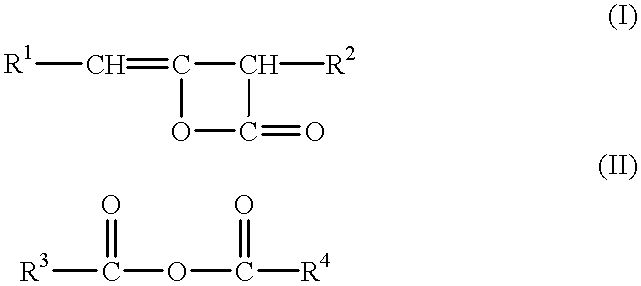Sizing of paper
a paper and paper technology, applied in papermaking, non-fibrous pulp addition, coatings, etc., can solve the problems of poor sizing, less favorable economic conditions, and deterioration of the efficiency of conventional cellulose-reactive sizing agents, and achieve improved stability and sizing characteristics, high cationic demand, and high degree of white water closure
- Summary
- Abstract
- Description
- Claims
- Application Information
AI Technical Summary
Benefits of technology
Problems solved by technology
Method used
Image
Examples
example 2
sizing efficiency of Dispersion No. 1 according to Example 1 was evaluated in this Example. An anionic AKD dispersion was also prepared by using carboxymethyl cellulose as a dispersing agent (5% by weight of CMC, based on the AKD) and tested for comparison purposes. This dispersion. Ref. 1, showed poor stability and was therefore used immediately after its preparation.
Paper sheets were prepared according to the standard method SCAN-C23X for laboratory scale. The papermaking stock used contained 80% of 60:40 bleached birch / pine sulphate and 20% of chalk to which 0.3 g / l of Na.sub.2 SO.sub.4.sup.- 10H.sub.2 O was added. Stock consistency was 0.5% and pH 8.0. The size dispersions were used in conjunction with a commercial retention and dewatering system, Compozil.TM., comprising cationic starch and an anionic aluminum-modified silica sol which were added to the stock separately; the cationic starch was added in an amount of 8 kg / ton, based on dry stock, and the silica sol was added in ...
example 3
Sizing efficiency of Dispersion No. 2 according to Example 1 was evaluated and compared to a conventional anionic AKD dispersion, Ref. 2, containing a dispersant system consisting of sodium lignasulphonate and cationic starch where the lignasulphonate is present in ionic excess.
The procedure of Example 2 was repeated except that the stock contained presipitated calcium carbonate as a filer instead of chalk and the dosage of cationic starch was 12 kg / ton, based on dry stock. In some of the tests 10 ppm of stearic acid was added to the stock in order to raise the cationic demand and the lipophilic substance content of the stock and to create conditions similar to those obtained with extensive white water recirculation. The results are set forth in Table 2.
As is evident from Table 2, Dispersion No. 2 according to the invention generally gave much better sizing than the anionic disperion Ref. 2 used for comparison, and considerably improved sizing effect was obtained when the stock had ...
PUM
| Property | Measurement | Unit |
|---|---|---|
| temperatures | aaaaa | aaaaa |
| diameter | aaaaa | aaaaa |
| particle size | aaaaa | aaaaa |
Abstract
Description
Claims
Application Information
 Login to View More
Login to View More - R&D
- Intellectual Property
- Life Sciences
- Materials
- Tech Scout
- Unparalleled Data Quality
- Higher Quality Content
- 60% Fewer Hallucinations
Browse by: Latest US Patents, China's latest patents, Technical Efficacy Thesaurus, Application Domain, Technology Topic, Popular Technical Reports.
© 2025 PatSnap. All rights reserved.Legal|Privacy policy|Modern Slavery Act Transparency Statement|Sitemap|About US| Contact US: help@patsnap.com

